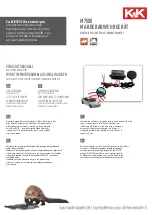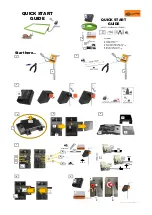
Les modules TX 223 et TX 224 sont des
actionneurs permettant d’interfacer des
ouvrants avec le bus EIB/ KNX.
Ils font partie du système d’installation Tebis.
Ils permettent la commande d’ouvrants tels
que volets roulants, stores à bannes, stores à
lamelles...
Configuration
●
TX 100 : description détaillée dans la notice
livrée avec le configurateur.
●
ETS : logiciel d’application TL 223 pour le
TX 223 et TL 224 pour le TX 224 : base de
données et descriptif disponibles chez le
constructeur.
Fonctions
●
4 voies indépendantes commandées par le
bus EIB/KNX.
●
4 contacts µ 6A 230 V
●
visualisation de l’état des voies sur le produit
F
GB
D
NL
I
F
1
6T 7202.a
6T 7202.a
E
S
P
N
TX 223:
230 V
4 sorties volets roulants
4 Rolladenausgänge
4 shutter outputs
4 rolluikenuitgangs
4 uscita tapparelle elettriche
TX 224:
230 V
4 sorties stores ou volets roulants
4 Rolladen- oder Jalousienausgänge
4 shutter or blinds outputs
4 rolluiken- of gordijnenuitgangs
4 uscita tapparelle o veneziane
elettriche
●
possibilité de commande manuelle des voies
à partir du produit.
Les fonctions précises de ces produits dépendent
de la configuration et du paramétrage.
Câblage, test et mise en route
En position manu du commutateur
➀
, le BP
➄
permet de commander en marche/arrêt la charge
raccordée.
La LED
➅
indique l’état de la voie :
allumée = voie en cours d’utilisation.
En position auto du commutateur
➀
, le BP
➄
est inactif. La LED
➅
indique l’état de la voie.
La présence du bus est signalée par l’allumage
de la LED
➇
après appui sur le BP
➂
.
Le clignotement de la LED
➅
en position auto
du commutateur
➀
indique le chargement d’un
mauvais logiciel d’application.
L’adressage physique se fait à l’aide du BP
➂
et est signalé par l’allumage de la LED
➇
.
Attention :
-
Appareil à installer uniquement par un
installateur électricien.
-
Respecter les règles d’installation TBTS.
-
Ne raccorder
qu’un seul moteur
par
sortie.
D
GB
auto
TX 223
Die Steuergeräte TX223 et TX224 sind
Betätigungsschalter, mit denen bewegliche
Elemente an den EIB/KNX-Bus angeschlossen
werden können. Diese Geräte gehören zum
Tebis-Installations-System.
Sie dienen zur Steuerung beweglicher
Elemente wie Rollos, Markisen, Jalousien usw.
Einstellungen
●
TX100: Ausführliche Beschreibung in der
mit dem Konfigurationsgerät mitgelieferten
Bedienungsanleitung
●
ETS: Anwendungssoftware TL223 für das
Steuergerät TX223 und TL224 für das
Steuergerät TX224: Datenbank und
Beschreibung beim Hersteller erhältlich.
Funktionen
●
4 unabhängige Kanäle, Ansteuerung
über EIB/KNX-Bus.
●
4 Kontakte, µ 6A 230 V
●
Zustandsanzeige der Kanäle am Gerät
●
Möglichkeit zur manuellen Ansteuerung
der Kanäle über das Gerät gegeben
Die genauen Funktionen dieser Geräte hängen von
der jeweiligen Konfiguration und den jeweiligen
Parametereinstellungen ab.
Anschluß, Test und Inbetriebnahme
In Stellung „Manu“ des Umschalters
➀
dient der
Taster
➄
zur Ansteuerung der angeschlossenen
Last im Modus „Ein/Aus“. Die LED
➅
zeigt den
Zustand des Kanals an: LED leuchtet = Kanal in
Betrieb.
In Stellung „Auto“ des Umschalters
➀
ist der
Taster
➄
deaktiviert. Die LED
➅
zeigt den Zustand
des Kanals an.
Das Anliegen des Busses wird durch das
Aufleuchten der LED
➇
nach Betätigung des
Tasters
➂
angezeigt.
Das Blinken der LEDs
➅
in Stellung „Auto“ des
Umschalters
➀
zeigt die Ladung einer falschen
Anwendungssoftware an.
Die Konfiguration ist nur möglich, wenn der
Umschalter
➀
in Stellung „Auto“ steht.
Die physikalische Adressierung erfolgt anhand des
Tasters
➂
und wird angezeigt durch die LED
➇
.
TX223 and TX224 drivers are actuators used to
interface closing devices with EIB/KNX bus.
They are part of the Tebis installation system.
They control devices such as roller shutters,
blinds with awnings, blinds with slats...
Configuration
●
TX100: See description included in the note
provided with the configurer
●
ETS: Software applications TL223 for TX223
and TL224 for TX224: The database and the
technical description are available from the
manufacturer.
Functions
●
Four independent channels controlled
by EIB/KNX bus
●
Four contacts µ 6A 230 V
●
Display of channel states on product
●
Manual control of channels is possible
from the product
The particular functions of each product depend on
the configuration and the set-up.
Wiring, test and startup
When switch
➀
is set into Manu position, BP
➄
makes it possible to set the connected load into
ON/OFF position. LED
➅
indicates the state of
the channel: ON = channel currently used.
When switch
➀
is set in Auto position, BP
➄
is
inactive. LED
➅
indicates the state of the channel.
LED
➇
switches on after depressing BP
➂
and indicates the presence of the bus.
When switch
➀
is in Auto position, the flickering
of LED
➅
indicates loading of wrong software.
Configuring is possible only when switch
➀
is in Auto position.
Physical addressing is done using BP
➂
:
LED
➇
switches on.
Achtung:
-
Einbau und Montage dürfen nur durch
eine Elektrofachkraft erfolgen.
-
Installationsvorschriften zur
Schutzmaßnahme SELV beachten.
-
Achten Sie darauf, die Antenne möglichst
weit vom Produkt entfernt zu halten.
-
Beachten Sie bitte, daß jeder Ausgang
nur
einen einzigen
Motor ansteuern kann.
Caution :
-
This device must be installed only by
a qualified electrician.
-
Conform to TBTS installation rules.
-
Move away the antenna from the product
as far as possible.
-
Each output can control only
one
motor.
/
RF
tebis
TP
230V~
Bus
29 V
L
N
L'
N
230 V 50 Hz
230 V 50 Hz
10 A
10 A
N'
1,5 mm max
2
1,5 mm max
2
1 3 5 7 9
13
11
15
8
12 16
6
10
14
auto
TX 223
➄
➅
➀
➂
➇
BUS
EIB






















